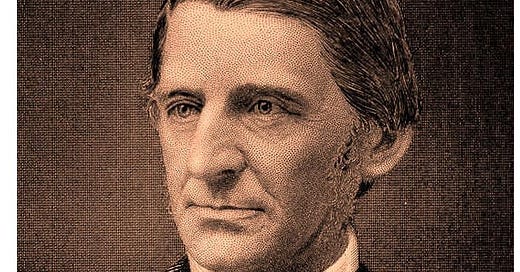A short, CRITICAL History of Philosophy: Chapter 54
What Should We Think Today of Ralph Waldo Emerson?
One reason for religion’s greater role in past bourgeois society is obvious. Youthful death was common. That compelled people to spend time ruminating upon the afterlife long before they could be sure of its arrival.
That must have been the case for Ralph Waldo Emerson, and it serves as a partial explanation for the enormous influence he had in his lifetime, one that was as great as any of his contemporaries. Emerson was the famous author who supplied the unknown but admiring Friedrich Nietzsche with his title for “The Gay Science.” The literal and philosophical godfather to William James, Emerson was also the illustrious advocate who helped launch Walt Whitman’s career. Equally, he was the friend and promoter of Henry David Thoreau, and the unquestioned leader of the Transcendentalist Movement. Emerson College was named after him when he was still alive, and his passing was front-page news across the country. By the time of his death, he was a national hero and an inspiration to millions.
His father was a Unitarian minister, and his mother was his father’s devoted helper. Born in Boston in 1803, Emerson was raised during the period when American women were encouraged to act as the stewards for “Republican Motherhood.” Women worked alongside their husbands in the fields and the shops. But there was a broad consensus that their first duty was to teach their sons and daughters to read and write in order that the next generation might be composed of valiant patriots committed to expanding the nation and setting an example to the world of the virtues of a country founded upon principles of freedom and self-governance.
Keep reading with a 7-day free trial
Subscribe to Jonathan’s Substack to keep reading this post and get 7 days of free access to the full post archives.



